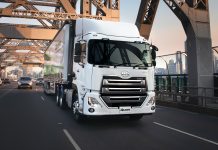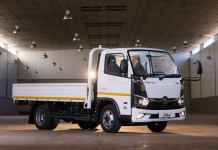Daimler Trucks & Buses (DT&B) has officially opened a new commercial vehicle dealership in Rustenburg. The outlet, Maemo Motors, represents an investment of R52-million and offers comprehensive sales and after-sales services for DT&B vehicles, including Mercedes-Benz trucks, vans and buses, as well as commercial vehicles in the Fuso range.
“The North-West Province is known for its mining activities and, to support this function, we are anchoring Maemo Motors as the foremost commercial vehicle dealership in the area,” says Kobus van Zyl, Executive Director of DT&B Southern Africa.
He said DT&B was preparing for a period of growth in Southern Africa and the investment formed part of the company’s plan to be the region’s benchmark commercial vehicle solutions provider.
Maemo Motors is situated just outside Rustenburg’s main Central Business District and is easily accessible from the N4, which many cross-border logistics companies use to transport freight to and from neighbouring countries.
The facility boasts 14 work bays and a large and impressively stocked parts department. The showroom has been custom built to house a variety of vehicles – including trucks – with a further display area within the forecourt’s precincts. A bistro is also situated on the premises.
The building incorporates a number of environmentally friendly features such as solar panel power generation; borehole water; motion-sensing lighting; natural light optimisation and low water-use gardens.
Repair fleet delivered to the JRA
The Johannesburg Roads Agency (JRA) has taken delivery of a fleet of 39 custom bodied Isuzu trucks which will be used in operations related to pothole repair in and around the city.
The trucks – which were designed and developed by the JRA in conjunction with Isuzu’s Kanu Body Construction division in Port Elizabeth – were delivered by Eqstra Fleet Management, the contract manager for specialised vehicles for the City of Johannesburg.
Eqstra had overall responsibility for product quality, cost control, project management and product compliance. The trucks, which utilise Isuzu’s 400 chassis platform, feature heavy duty tipper bodies designed to carry hot asphalt from the JRA’s depot to the pothole site.
The double cab configuration offers space for six repairmen and the driver, plus storage space for traffic signs and tools. By changing the location of pins on the load body, the tipper section can tilt to the left, right or rear.
“The units have been specifically designed to improve occupational safety and productivity of maintenance staff when dealing with hot asphalt” says Sean Phillips, managing director of the JRA. “The vehicles have gone into service with immediate effect and we look forward to resultant improvements in operational efficiencies.”
Serco builds theatre on wheels
 The Joburg Theatre wanted to get more exposure for its productions by taking them to the people – and specialist truck body and trailer builder Serco helped to turn the dream into reality.
The Joburg Theatre wanted to get more exposure for its productions by taking them to the people – and specialist truck body and trailer builder Serco helped to turn the dream into reality.
The client’s brief included aspects such as allowing audiences in an open air environment to experience a show as if they were watching a performance in an auditorium. Accordingly, Serco set about building a theatre on wheels, complete with a stage.
First, a 3D model was constructed so that Joburg Theatre representatives could visualise how the theatre for the road would look. Once approval had been obtained, a 15,5-metre trailer was designed, incorporating a hydraulically actuated 10-metre section of wall engineered to fold out to create a stage.
To accommodate lighting elements, the trailer’s roof was designed to extend hydraulically by 1,4 metres to a total height of 5,8 metres, while a 38KVA generator was incorporated in a separate compartment within the structure.
Other elements include a fully equipped change room and curtaining that stretches along the sides and rear of the stage to conceal mechanical sections of the trailer, giving the appearance of a permanent structure. However, when on the move, the theatre looks similar to a standard box trailer.
VW Truck & Bus ups global sales
Volkswagen Truck & Bus sold more than 89 000 vehicles globally during the first six months of 2016, an increase of 3,0% compared with the previous year’s figure. The company markets trucks and buses under the MAN, Scania and Volkswagen nameplates.
According to a company statement, trading conditions in South America and Russia continued to present a challenge, though markets in Europe showed pleasing results. “Thanks to strong demand and a highly competitive range of vehicles, we have succeeded in increasing our unit sales in the first six months,” said Andreas Renschler, CEO of Volkswagen Truck & Bus.
He said he was pleased with the achievement and was optimistic that sales momentum would be maintained during the next six months. “We are pleased with developments at the Volkswagen Truck & Bus Group. We tackle important issues together, implement quickly, and remain firmly focused on our goals – to become global champion within the next decade.”
 During the first six months, MAN Truck & Bus sold 39 700 units (+4% compared with the prior-year period) and Scania 40 310 units (+9%). MAN Latin America sold 10 130 vehicles representing Volkswagen and MAN, down 19% as against the first six months of 2015.
During the first six months, MAN Truck & Bus sold 39 700 units (+4% compared with the prior-year period) and Scania 40 310 units (+9%). MAN Latin America sold 10 130 vehicles representing Volkswagen and MAN, down 19% as against the first six months of 2015.
The statement added that, since June, electrically powered trucks built by Scania had gone into a testing phase in Sweden while, later this year, the brand would also be introducing flexible maintenance plans for conventionally driven trucks.
“Thanks to continuously monitoring and assessing operating data, we will now be able to call in vehicles for service when maintenance is needed. This will help to minimise unplanned visits to the workshop and ensure that preventive maintenance can be carried out in time. The option of flexible maintenance schedules will be available in all European markets by the end of 2016,” the statement said.
Bus of the future
 The world’s biggest bus manufacturer, Daimler Buses, recently tested its City Pilot feature on its Mercedes-Benz Future Bus by driving the vehicle autonomously on a 20km route through Amsterdam in the Netherlands.
The world’s biggest bus manufacturer, Daimler Buses, recently tested its City Pilot feature on its Mercedes-Benz Future Bus by driving the vehicle autonomously on a 20km route through Amsterdam in the Netherlands.
The bus reached speeds of up to 70km/h, stopped to the nearest centimeter at bus stops and traffic lights, passed through tunnels, braked for obstacles or pedestrians and communicated with traffic signals. A driver was on board to monitor the system.
According to a statement, Daimler is the world’s first vehicle manufacturer to have put a bus into automated operation in a real-life traffic situation. Spokesman Wolfgang Bernhard said City Pilot was an extension of the company’s Highway Pilot system, which has been successfully tested in autonomous drive trucks.
According to the company’s claims, advantages of using City Pilot include smoother operation, better fuel efficiency and less stress on the engine, each of which has a positive impact on operating and maintenance costs and well as helping to extend the vehicle’s life span.
The bus’s autonomous drive technology incorporates long- and short-range radar, a large number of cameras and a satellite-controlled GPS navigation system. Intelligent connectivity of cameras, sensors and the GPS is said to be pioneering in terms of the precision they offer.















